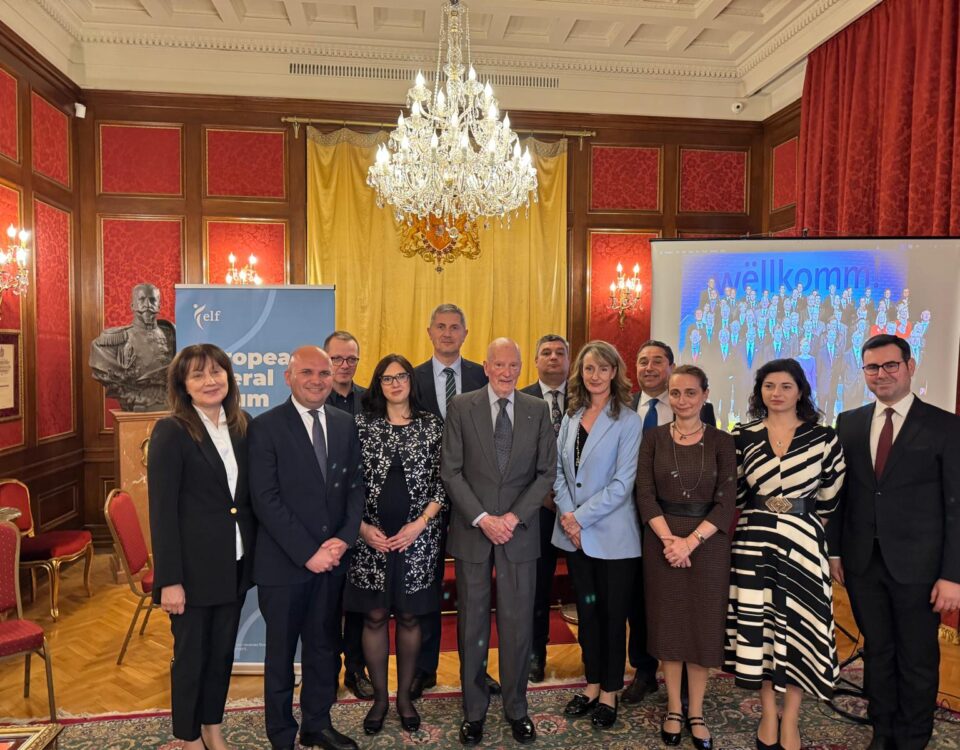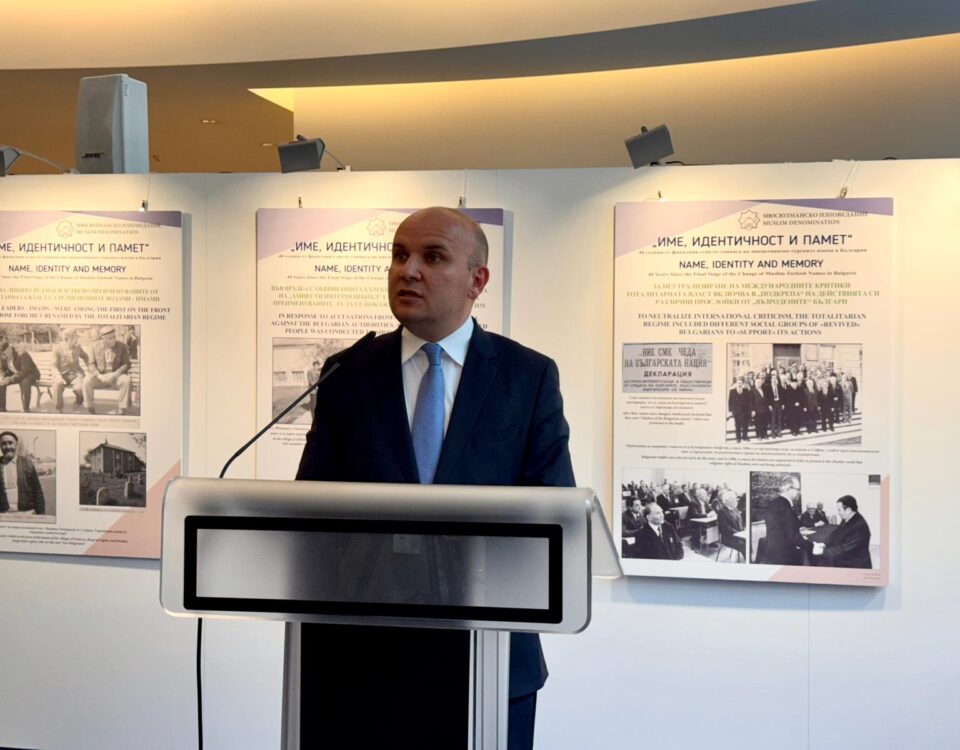
Ilhan Kyuchyuk: MRF will work for the accelerated democratic development of Bulgaria
February 19, 2019
MEP Ilhan Kyuchyuk welcomed students from Sevlievo and MRF members and friends to the European Parliament
March 19, 2019Interview for 24chasa.bg
The upcoming European elections will be a battle between those who want more integration and those who are fighting for Europe with national boundaries. The MRF is convinced that the change of power should not happened on the model “Get-up to sit-up” but through a political unity around a group of priorities and an accelerated program development
Mr. Kyuchyuk, the European elections are coming, what is your forecast? Do you think that the growing populism take will make significant gains and will it lead to major upheavals in system parties?
The truth is painful – if we want to fight populism, we have to admit its recent gains. Millions of people in Europe today are dissatisfied and deny the system they were brought in by the political class. They are deeply divided and do not believe that the EU is capable of solving their problems. We must show to these people that Europe is capable both – to act in the best interest of its citizens and to take important decisions for their future. Otherwise, freedom and solidarity, which we all accepted as granted, will continue to be under fire. To summarise in one sentence, the upcoming European elections will be a battle between those who want more integration, and those who want Europe with national borders. The second battle will be between the progressive forces and the familiar status quo.
MRF often talks about hate speech on Bulgarian political ground. How strong it is in Europe?
What is happening in Europe is a reflection of the political realities in the Member States. Unfortunately, hate speech is present in all European societies and is at its highest point since the end of WWII. This is an extremely dangerous trend for the EU’s unity. We are witnessing horrifying expressions and usage of hate speech in the Netherlands and France, some of the most tolerant countries in the world. There is no rapid treatment for this social illness. Strong efforts from the whole society are needed to cure it.
Politicians in Bulgaria and Brussels are worried about possible hybrid attacks around the European elections. Is it possible the vote of the European citizens to be distorted?
Election attacks and election campaigns attacks are usually divided into two categories: technology based approach and behaviour based approach. The first category includes cyberattacks that manipulate the electoral process or the voting technology in order to change the number of votes or the number of voters. An example of the second category is the spread of hate speech on the Internet, which aims to set society up and divert it from the real debate about politics. In fact, within this mandate, we have proposed a number of measures to restrict the influence of third parties on the electoral process, but that does not mean that transparency is guaranteed, and cyber-attacks are myths. President Macron goes further, offering European Agency for the Protection of Democracies to fight against cyber – attacks and manipulations.
According to you, how will Brexit affect the next European Parliament and the ALDE party in particular?
First and foremost, we have to see how Brexit will end. To date, what is clear is that the number of MPs in the next Parliament will be reduced from 751 to 705. This will not affect the number of MEPs from Bulgaria. Similarly, it stands the issue for the liberal group, as we have only one MEP from the UK. But the big losers in the next parliament will be the party of European Conservatives, the core of which is made up of British MEPs, and the party of European Socialists, which currently have 19 members from the Labour Party.
Is there a chance of unifying Europe around the reform launched by the president Macron? In Bulgaria the business is sceptical. This can mobilize citizens for participation in the European elections or, on the contrary, to frighten and repel some of them?
I welcome President Macron’s plan for “European revival” in general. As a matter of fact, this document is a continuation of the previously signed Aachen treaty between France and Germany, which outlined the new track of the European integration. Of course, many of the proposals are yet to be analysed in detail. Nevertheless, I accept the text as one of the starting points for debate.
Which political party will partner the ALDE group in the next EP? Is there a possibility for a big coalition with the left as Sergei Stanishev, the president of PES, talk about?
The European elections predict a big shake of the European Parliament. According to projections for the first time in 40 years of direct elections “The Big Coalition” of center-left and center-right who manage the institution will lose their majority. In any case, a wider agreement, including ALDE, will have to be sought.
For the first time, the Youth MRF will host the Congress of the International Federation of Liberal Youth. What are your expectations from the forum, which will be held only a month before the start of the election campaign in Bulgaria?
The Youth MRF has a long history of fruitful cooperation with IFLRY. Young people of MRF has always proclaimed fundamental human rights and freedoms as its political philosophers and deny any form of discrimination. Youth MRFis the largest youth liberal organization in Europe and over the years we have also been highly recognized by international liberal organizations. For us, these are not elitist positions, but an opportunity to participate in shaping the agenda of young people around the world. Such an opportunity is the General Assembly of the International Federation of Liberal Youth, which will be held this month in Sofia. Sadly, our generation lives in insecure times and we need to find common solutions to global challenges. Young people want to work together and look for a solution how to guarantee a better future for the generations to come.
When MRF’s candidate list will be ready and how will you keep your current 4 mandates in the new EP?
There are clearly defined rules and criteria for nominations in the MRF that pass through every party structures. The procedure is already in progress. By the end of March, the extended sessions of MRF district councils will nominate candidates who are meeting the relevant criteria and who will be offered as nominations to the Party’s Central Electoral Staff.
To expect new faces in it and who will be the leader?
We’re about to find out.
In the forthcoming European elections, political lusts in Bulgaria are very strong
I’m not a supporter of the parliamentary boycott. This is a typical political process inherent in the Balkan countries. We are seeing it in Serbia, Montenegro, Albania. You know that this practice in our country was imposed years ago by GERB, and now BSP does the same. But what does Bulgarian society gain from all of this? Opposition plays an important role in the political life of each country. – More and more in recent days, it is clear that MRF supports the government in critical moments. But does not this contradict your insistence on removing the patriots from power? – The country is in a severe political crisis. We see the failure of a number of sectoral policies. We in the DPS warned of this scenario even when compiling this incompatible majority. Lack of vision and adequate policy is so tangible. Bulgaria needs a new approach to governance. However, the Movement for Rights and Freedoms (MRF) has repeatedly stated that the change of power should not take place on the model “Stand- up to sit-up”,but on the basis of a political unity around a group of priorities and an accelerated development program of the country that includes a clear vision and goals and be respected from any government.
Тази публикация е достъпна и на следните езици: Bulgarian




